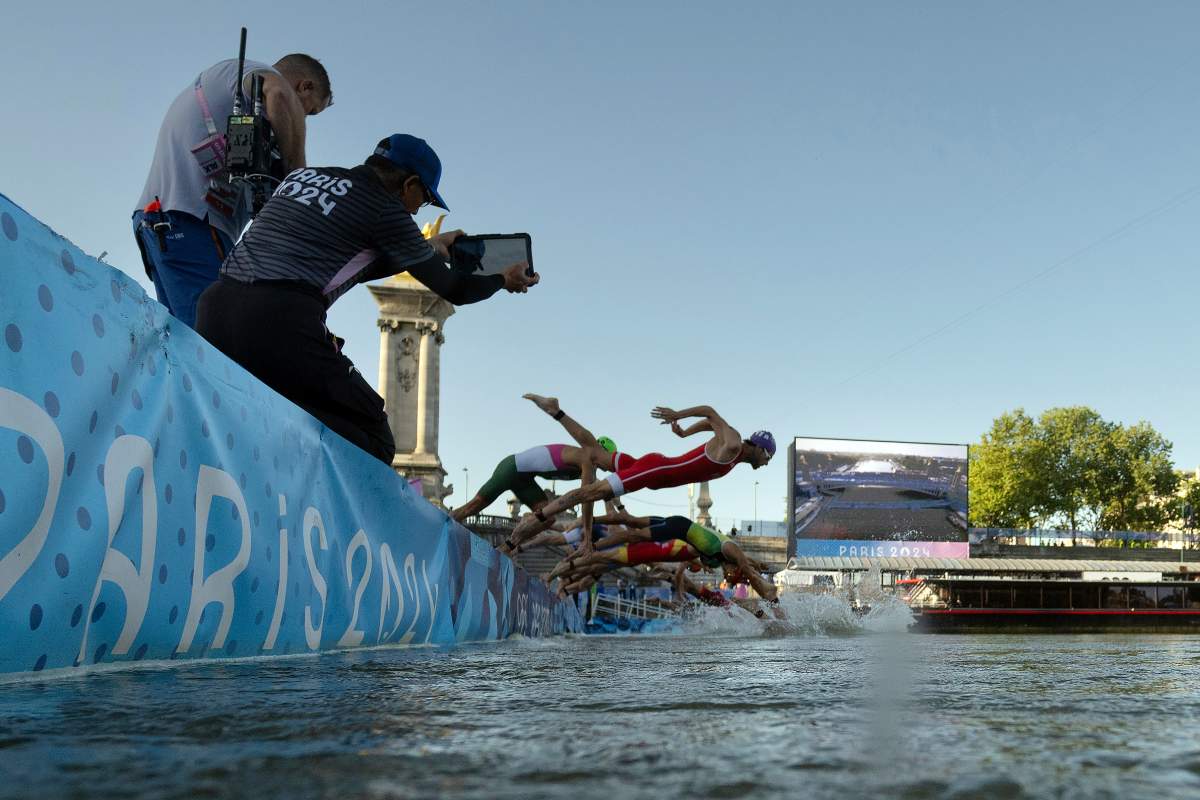Some Olympic triathletes who swam in the River Seine have fallen sick and were forced to pull out of competition this week amid concerns about the river’s water quality – a simmering issue plaguing Paris 2024 organizers.

Team Belgium withdrew from Monday’s mixed relay triathlon after one of its athletes, who competed in the women’s individual triathlon event last week, got ill.
Meanwhile, Switzerland had to revise its own mixed relay lineup not once but twice due to gastrointestinal infections affecting two of its athletes – one of whom had competed in the men’s individual triathlon event held in the Seine on July 31.
The Associated Press also reported that a female triathlete from Sweden and a men’s triathlete from Norway got sick after competing in their individual events in the Seine last week.
It’s not yet clear if the illnesses were due to Seine’s water quality – which has been a constant concern in the lead-up to and throughout the Games.

In an emailed statement to Global News on Tuesday, a Paris 2024 spokesperson said “the health and well-being of athletes is our top priority.”
“With respect to competitions held in the Seine, water quality tests are carried out daily and the decision on whether to proceed with an event is taken by the International Federation, World Triathlon, in coordination with Paris 2024, and based on the test results and a range of (notably health) criteria,” the spokesperson said.
Bacteria levels had forced organizers to postpone the men’s triathlon by one day last week.
After days of uncertainty, more than 100 triathletes dipped into the Seine to compete in the men’s and women’s individual races last week.
On Tuesday, a test run meant to allow Olympic athletes to familiarize themselves with the marathon swimming course in the Seine was cancelled over water quality concerns.

Get weekly health news
The cancellation of Tuesday’s marathon swimming test event comes a day after the triathlon mixed relay event was held in the river that runs through the centre of the French capital.
World Triathlon released data on Tuesday showing that when the triathletes swam in the mixed relay on Monday, the levels of fecal bacteria E. coli and enterococci were within acceptable levels for the length of the triathlon relay course.
Why are triathletes getting sick in Paris?
At least four triathletes have been reported sick in recent days following their swim in the Seine last week.
The Belgian Olympic and Interfederal Committee (BOIC) said in a statement on Sunday that triathlete Claire Michel was “unfortunately ill and must withdraw from the (mixed relay) competition.” Michel had competed in the women’s individual event on July 31.
“The BOIC and Belgian Triathlon hope that lessons will be learned for the next triathlon competitions at the Olympic Games,” the committee said.
Swiss officials announced on Saturday that triathlete Adrien Briffod, who also had competed in the Seine on Wednesday, would not compete Monday after falling ill with a stomach infection. On Sunday, they announced that Simon Westermann, who had been tapped to replace Briffod, also had to withdraw because of a gastrointestinal infection. Westermann had not participated in any swims in the Seine.

Vetle Bergsvik Thorn of Norway, who competed on Monday, also became sick in recent days. He said he had a bad stomach illness for about 12 hours but said “it’s hard to say if it’s the river or just some ordinary food poisoning.”
“It’s been quite a few stressful days with not knowing if we can swim or not,” he said.
Swedish triathlete Tilda Månsson got sick on Saturday, three days after competing in the women’s triathlon, according to Swedish Olympic Committee spokesman Lars Markusson. Though the cause of her illness was unclear, Markusson told Swedish broadcaster SVT that “since others have also become ill perhaps you don’t need to be a doctor to draw the conclusion that it had to do with the swimming in the Seine.”
Global News is awaiting a response from the Canadian Olympic Committee (COC) about any concerns or illnesses affecting its triathletes.

Two more Olympic events are left to be held at the Seine with the women’s marathon swim scheduled for Thursday and the men’s marathon swim scheduled for Friday.
Before the start of the Summer Games, experts had warned about the potential health risks of swimming in polluted water for athletes.
In a previous interview with Global News, Ted Steiner, an infectious disease physician at Vancouver General Hospital, said although E. coli infection in water can happen in certain cases, it’s typically not the biggest concern.
E. coli is a marker that there may be other parasites, bacteria or viruses that could potentially be more contagious, Steiner said last month.
“The concern for swimmers is that as they’re breathing, they can certainly get some water in their mouth and swallow enough potentially to get a large enough dose to get sick,” he said.
Bacteria associated with fecal pollution can lead to gastrointestinal infections, causing an upset stomach, vomiting and diarrhea and there is also a risk of infecting the ears and respiratory tract, said Marc Habash, an associate professor at the University of Guelph’s school of environmental sciences.
— with files from The Associated Press.





Comments
Want to discuss? Please read our Commenting Policy first.